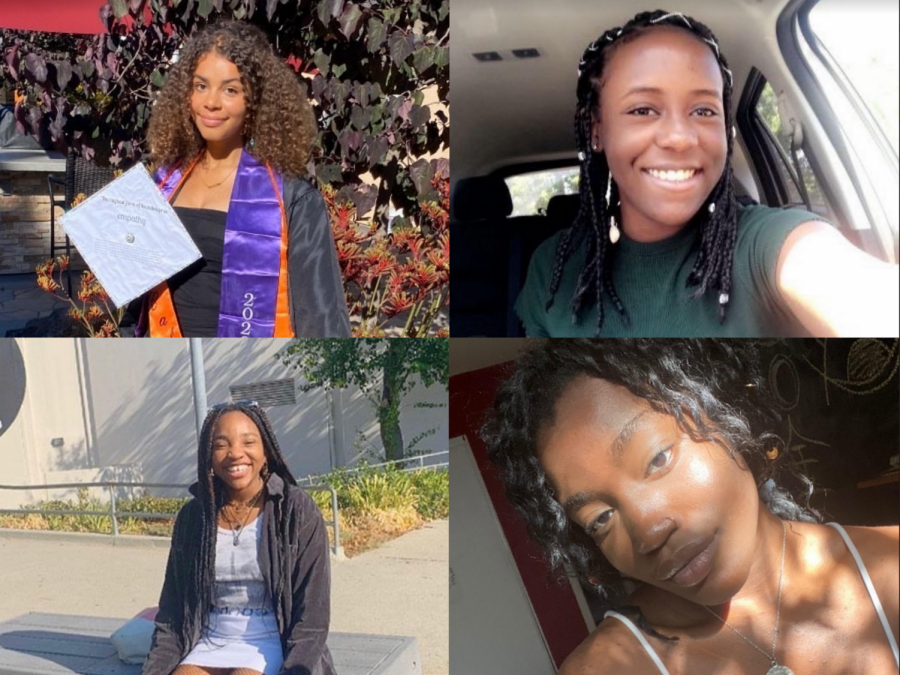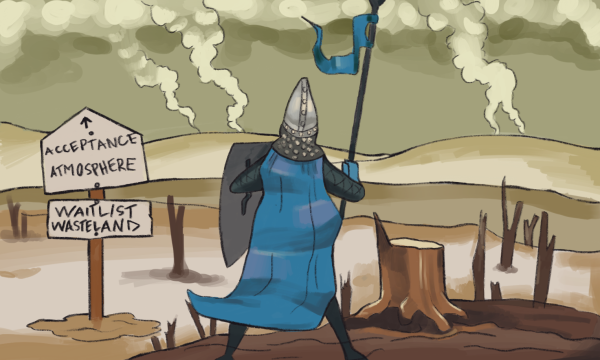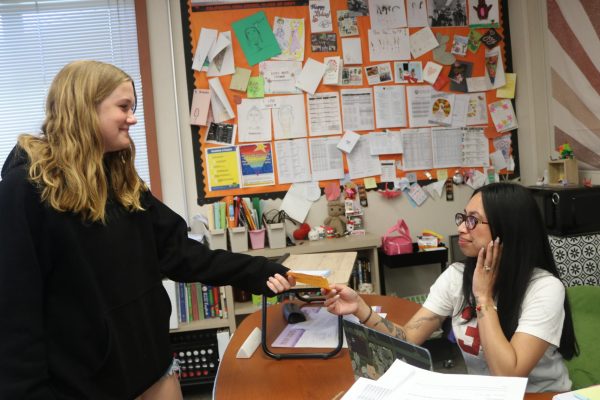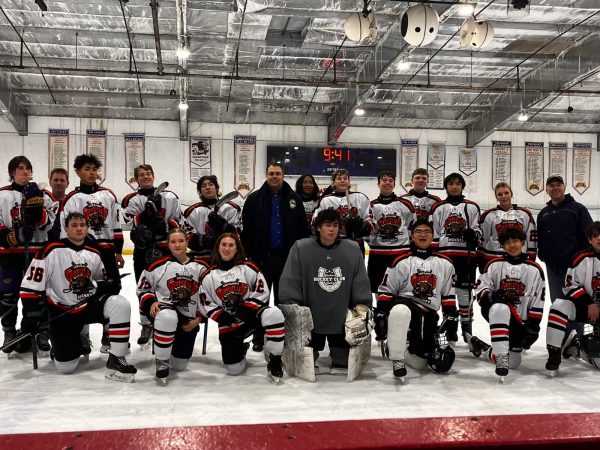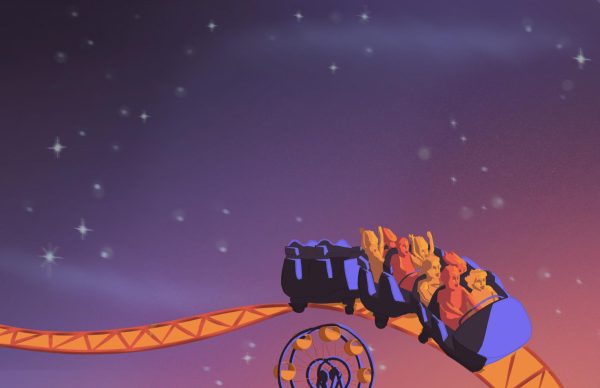Cal High’s Black Student Union answers questions about Black Lives Matter
Students pictured are Paige McKindra (top left), Jordan Nabwe (top right), Chinwe Nwankwo (bottom left), and Lajolie Beugre (bottom right).
In response to the recent protests over the police killing of George Floyd in Minneapolis, Minnesota, The Californian partnered with the Cal High Black Student Union to publish a Black Lives Matter Week. To end the week, we are publishing a transcript of a conversation that occurred between 2020 Cal High graduates Paige Mckindra, Jordan Nabwe, Lajolie Beugre, and Chinwe Nwankwo of the BSU, covering the protests, social media trends, and the failures of Cal High and the education system when it comes to racial education. Please read Part 1 of this incredibly insightful conversation below.
Since there’s been an uproar in social media posts and people supporting the movement online, do you think people think that #blacklivesmatter is just a trend and that protests are just a trendy thing online? Or do you think people are actually starting to care?
Jordan: A lot of our political correctness and ideas of this generation are a trend in general. Aspects of this process that are less meaningful are definitely trends are like the black square thing. I’m not opposed to trends especially if they’re going to target an actual goal, but we need to as a society and as a country be on the trends that are actually going to lead us to progress. We can have a day where we all post black squares, but how about when it’s time to vote, you all post that you’ve voted, because that actually makes some change. People should be in that spirit, like “hey look I care about this cause” even though I can’t sit here and police people’s intentions, but even if people don’t have right intentions behind their actions, if their actions are meaningful, then I’ll appreciate their actions. But at the end of the day, if you’re just posting that you’re supporting something, and you’re not doing anything, you’re not educating yourself, it becomes meaningless.
Lajolie: I definitely think that social media, because there’s a huge conventionality happening, you have people that are just seeing it, and copying whatever is happening, but at the same time, I do think that it is inspiring people because it is a trend, and that is causing people to look more into it. Sometimes they don’t look into it, but specifically with social media, if you’re not really spreading information, people are seeing you in a certain light, like people are reposting things, so they’re being seen as “oh they’re probably educated because they’re reposting these things,” and in that, you yourself are learning something, so it’s very difficult to be on social media and NOT learn anything. Specifically with the Black Lives Matter trend because there’s people posting information, which goes back to the whole black squares thing, people specifically said don’t put #blacklivesmatter because that has information.
Chinwe: Social media is the new way that people receive new information, that’s the biggest way people get information. With the whole BLM becoming a trend, I don’t think it’s a bad thing, but there’s both good and bad. Information is more available to people, but there’s also people using opportunities to destroy things, go crazy, using the BLM movement as a guise to wreak havoc, but that’s not what the Black Lives Matter movement is about. Or people taking aesthetically pleasing pictures at protests. Those things take away limelight from the real meaning behind the movement. So there’s always good and bad.
Paige: I definitely think some people are just treating it as a trend, whereas some people are using it to spread information, I know there was a controversy with Madison Beer that she hired a camera crew to take pictures of her protesting, examples like that are really excessive and I bet that people from Cal High are doing similar things, but there’s other people who truly want to spread information, and write their own information or their own stories. So I believe that those people truly want to educate others through social media because that’s how our generation communicates.
What do you guys think of the different types of protests that people are doing?
Jordan: I’ve been thinking about this a lot. I know that we’ve had this discussion of the Malcom X type root versus the Martin Luther King type root in creating change and progress. When we say the different types of protesting, we have to be clear that, in what I’ve seen, the protests were peaceful and the looting was violent, so there is a distinct separation between the two, because even though things break out at peaceful protests, it’s usually the people that went there with the intention of stealing and looting that cause that to happen, so we should separate that from people who genuinely feel that they should be peacefully protesting for the movement. I do feel like there are some people that do feel/think “let the city burn” or “let it go up in flames.” That’s a lot of anger- I think that we’ve seen anger in our country and rather than trying to look at where that anger is coming from, we automatically get afraid of people and attack them. But I think we as a country need to have some consistency in what we view is the right way of protest and who we view is right in our country. We tend to praise people in history for doing things, and now when things happen in 2020, it’s suddenly not okay. If we can all agree that violent looting and protesting is the wrong way to protest, then we should agree that our founding fathers protested wrong. They also rioted, they burned things, they violently forced the resignation of over 40 crowned officials in the Stamp Act riot alone. I think one of the problems we’re seeing right now is that people are separating Black people from America, and people are saying “This is how Americans protest and this is how you protest and it’s wrong!” Like no, no, no, we’ve had this issue of using violence to get our voices heard in this country for hundreds of years, so I would like to see some consistency in how we think about this issue, and if we do, we’ll show the right amount of sympathy towards everyone.
Chinwe: I totally agree with what you’re saying and I feel like a lot of the time, it’s not that one protest is wrong or not, it’s about when the people who are protesting are mainly Black people, and when Black people do things, it’s seen as negative and aggressive, and I think that’s the wrong perspective to see it. Because if you look at other movements, the way they got their voices heard, was they started off peacefully, because that’s how all protests start, but when peace is not enough, people get angry and they want change, and if there’s no change, people become violent. Sadly, our society works in the way that violence will get the answer sometimes. The most American thing to do is literally to riot. It’s in our history books. If you look at how LGBTQ got their rights, if you look at how we got 40 hour work schedules, they were all from rioting. People need to realize that and stop looking at it in a very close minded outlook, and this is how people are going to express themselves if things continue to not change and if Black lives continue to get killed.
Lajolie: That’s real. I had a conversation with my boyfriend about this, because it’s because of the threat of violence that people listen and they actually want to start changing things. He was kind of angry at that, but no if you think about it, if someone is always super nice to you, you might take that for granted. So it’s like if you see the state of love and state of war and chaos that can come from not going the alternative route, then you’re most likely going to pick the route that is most peaceful because you’re not trying to go to war. That’s just how human beings learn how to do things.
Paige: It feels like people can choose the type of way Black people protest, because even when we have peacefully protested in the past, like with Colin Kaepernick, people responded to that like it was violent even though that was very peaceful. It seems that not only do people want to say you have to protest in this one way, within that type of protesting, you have to do certain types of things. By doing that you are taking away from people’s freedom to protest.
Jordan: I want to propose a question for people who are reading- just as a person, the first thing you should do before you judge or look at a protest, is, you should ask yourself, “do you think people should ask for rights they are entitled to or should they demand them? Do you think people NEED to ask for something they believe they are already entitled to?” That’s just a question people should answer using their own morality.
What do you think the average citizen can do to help?
Lajolie: I feel like it’s just education, that’s really what it comes down to. There’s no excuse anymore. Before, you only could go to specific libraries or whatever books you had in your home- and don’t get me wrong I’m sure there are disparities when it comes to accessing the internet, but on a very widespread scale the internet is usable for many people. So if people want to go and they want to understand, “Why do these people believe in what they believe in? What is the Civil Rights Movement? What is understanding all of these inherent things in American society?” because nonetheless these things are happening to Black people, but they’re American Black people. They’re still Americans, and this is still real. I feel like the average citizen can go read books- and that’s going to be a process, that’s not even going to be right. I’m sure that when we were growing up and we were learning what it was like being Black in America, we came across some ideas that we believed in, and there were some ideas that we didn’t believe in. There are a lot of complexities, but that’s a part of getting educated. It’s a sticky process.
Paige: With that information people can go out and vote, because the average citizen can’t do a lot but the government can, so it’s really important that people vote. Only about half of America votes, which is crazy. Imagine the impact that American citizens could have if we all voted.
Chinwe: I feel like education is one of the major things. We live in a day and age where knowledge is so tangible. All you have to do is literally google something, and you’ll find millions of sources to find where people are coming from. And I feel like also just being empathetic. Trying to put yourself in other people’s shoes will allow you to see things in a totally different perspective. I feel like a lot of people today don’t want to be empathetic, because they don’t want to understand where people are coming from. They like their little bubble of ignorance they get to stay in. When you put education and empathy together people will learn more, and they will understand the Black Lives Matter movement a million times better.
Jordan: This is the perfect time to be educating yourself. We’re in quarantine, a lot of people don’t really have anything better to do. At the end of the day we as people need to be upgrading ourselves. If you learn something that you had never heard before and then you don’t consult your own moral agents to evaluate whether your opinion is consistent with this new knowledge that you have… you need to be upgrading yourself. Learn new things, then look at your opinions: “Now that I have a new level of understanding, do I have these same opinions?” Consult your moral agents, go about upgrading yourself throughout this time where we have very little else to do. I agree with the need for more education. People need to put more of an emphasis on learning the history of Black culture, learning the history of other people’s cultures. But also when we look at history, don’t just look at those words in a book, don’t just say to yourself, “oh this is what happened to these humans.” Really internalize what it would mean to live under certain conditions for so long. Understand how people -just people as a whole- are in general, and how people become who they are, how cultures are created. Educate yourself on sociology, educate yourself on psychology. All of that combined would be amazing. Once you educate yourself, look back at school and everything they failed to teach you, and be angry. I’ve been angry for a while.
Lajolie: To add on to that, I know that a lot of people -I’m guilty of this too- grew up with a certain ideology. I think sometimes we’re too prone to look on one side, and only think our side is right. And honestly if you only think that only your side is right, that’s just propaganda. If you believe that whatever you’re reading is the best thing out there, it can make you ignorant as well. So it’s learning about all of the different aspects of America, and all of the different aspects of what it means to be a different person in this country, is super important as well. That makes you a well-rounded thinker, you’re not just thinking through your own narrow perspective.
Paige: It’s really hard to find sources to read and get educated that aren’t biased, so I think the only thing you can do is just read from a variety of different authors and perspectives.
On Twitter, there have been people who have called out other people saying the N-word and some believe you shouldn’t be calling people out on such a public platform, you should give them personal space to change and get educated. What do you guys think?
Chinwe: Many of the people being called out have been posting these things on social media, and anything you say on social media will forever be on social media. We all learned at a very young age to be careful about what you post on social media because guess what? It always comes back in tenfold. And I feel like a lot of people are mad that they posted it on a private account, but it’s still on social media and it will come to light and people will see what you said in the dark. That’s how the universe works. And if you are upset that people are “exposing you,” then why did you say it in the first place? You only said it because you didn’t think there would be a negative outcome, but that is not how life works.
Jordan: Reverend Dr. Martin Luther King Jr. said that he wanted to live in a world where people were not judged by the color of their skin but by the content of the character. And the things that you say are a reflection of the content of your character, this is what equality looks like. You get held accountable for the things that come out of your mouth. Why are you surprised? Is this new? Are we just now holding people accountable. You know, it is new. I just answered my own question. This is new. We are just now starting to hold people accountable for the things that are coming out of their mouths and it’s got to happen.
Lajolie: Literally Skai Jackson was out here like “I will out all of these people ” Honestly, I know people say that they are young and I think it’s BS to a certain degree. We are all young but we all know what we should and shouldn’t be saying and we know that people purposely do things on social media to get a certain reaction. There are things called shock comedy, where people do something very outwardly and nonconventional to spur something from the public and by doing that, people are going to react. I’ve had people tell me that White boys saying the N-word is a meme. That just tells you how disconnected people are from other people. You are literally doing this and posting it on social media because you’re selfish and wrapped up in your own world that you want to be seen and not even know what you are being seen for. And that’s a crazy thing. Social media should be taught in a class itself because what it does to kids psychologically is insane.
Please stay tuned for Part 2 of this conversation, to be published tomorrow.
